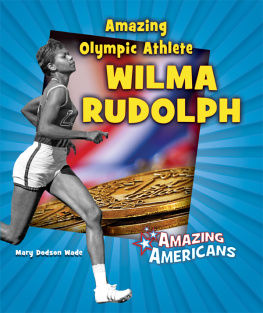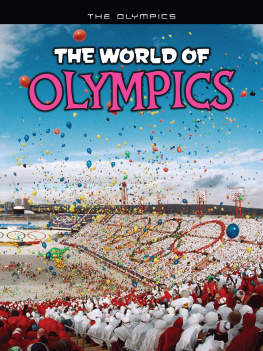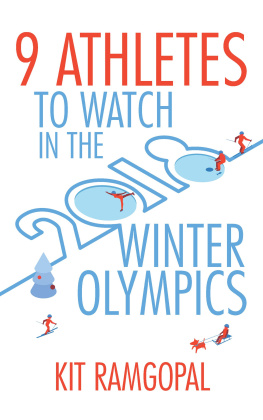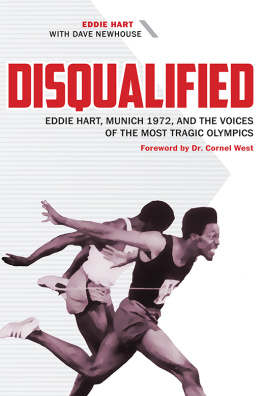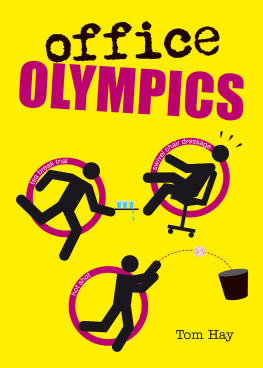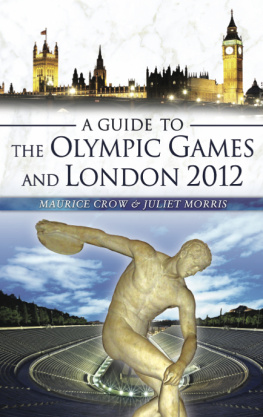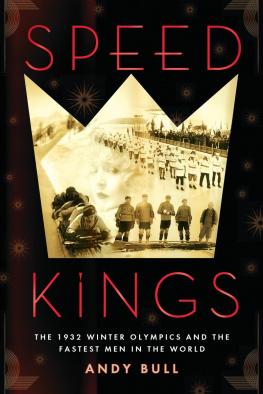The Olympics Most Wanted
Also by Floyd Conner
Baseballs Most Wanted
More Baseballs Most Wanted
Footballs Most Wanted
Basketballs Most Wanted
Golfs Most Wanted
Hockeys Most Wanted
Tenniss Most Wanted
Wrestlings Most Wanted
The Olympics Most Wanted
The Top 10 Book of Gold Medal Gaffes, Improbable Triumphs, and Other Oddities
Floyd Conner

Copyright 2001 by Potomac Books, Inc.
Published in the United States by Potomac Books, Inc. All rights reserved. No part of this book may be reproduced in any manner whatsoever without written permission from the publisher, except in the case of brief quotations embodied in critical articles and reviews.
Library of Congress Cataloging-in-Publication Data
Conner, Floyd, 1951
The Olympics most wanted : the top 10 book of gold medal gaffes, improbable triumphs, and other oddities / Floyd Conner. 1st ed.
p. cm.
Includes bibliographical references and index.
ISBN 978-1-57488-413-5 (paperback)
1. OlympicsMiscellanea. 2. AthletesAnecdotes. I. Title.
GV721.7 .C66 2001
796.48dc21
2001043524
Printed in Canada on acid-free
paper that meets the American National Standards
Institute Z39-48 Standard.
Potomac Books, Inc.
22841 Quicksilver Drive
Dulles, Virginia 20166
Designed by Pen & Palette Unlimited.
First Edition
10 9 8 7 6 5 4 3 2 1
Contents
Notable Olympic firsts
Nude athletes and chariot races
Olympic and political rings
Silver medals to the silver screen
Patton, Krupp, and Dr. Spock
Football stars who were gold medalists
Memorable moments in Olympic basketball
They were what they wore
One-of-a-kind Olympic feats
Famous Olympic nicknames
Nicknames they would rather forget
They were born to be Olympians
Unusual names of Olympic athletes
Breakfast, lunch, and dinner of champions
Brandy, sherry, and champagne
Olympic-sized athletes
Small athletes with huge talent
Old Olympians
The youngest Olympic competitors
Athletes who excelled in more than one event
They won three in a row
Ten who won ten medals
Dominating Olympic performances
Kings, princes, and lords
Olympic family affairs
Romance at the Olympics
The womens struggle for equality
Pioneering black stars
The strangest Olympic competitions on record
Unusual Olympic sites
Foul weather at the Olympics
Olympic believe-it-or-nots
Astonishing success stories
They overcame career-threatening illnesses
Injuries did not end their Olympic dreams
Superstitions and lucky charms
All their luck was bad
Spectators who left their mark
The Games most colorful characters
Psyching out the opposition
Poor sportsmanship
Who could have predicted?
The Olympics biggest shockers
What could have been
Great athletes who never stood atop the podium
Unsung Olympic heroes
Women figure skaters who never won gold medals
Moments they would rather forget
Costly mistakes
The most dismal Olympic performances
They brought home more than medals
Anything can happen
Athletes with more than one country
Winning any way you can
The biggest controversies in Olympic history
Judging the judges
Sit-down protests and walkouts
Stripped of their medals
They tested positive for drugs
Blood in the water
When the games turn deadly
They died fighting for their country
Falls, suicides, and murders
The closest finishes in Olympic competition
Notable Olympic lasts
List of Photographs
Michael Johnson
Hendrika Mastenbroek
Kerri Strug
Al Oerter
Bob Beamon
Nadia Comaneci
Jesse Owens
Wilma Rudolph
Florence Griffith-Joyner
Mildred Babe Didrikson
Billy Mills
Mary Decker Slaney
Tommie Smith and John Carlos
Frank Shorter
Bob Seagren
Bob Mathias
Jim Thorpe
Introduction
The ancient Olympic Games were held in Olympia, Greece, from 776 B.C to A.D. 393. In 1896, the first modern Olympic Games took place in Athens. Except for interruptions due to World Wars I and II, the Summer Olympics have been contested every four years. The Winter Olympics were created in 1924. The 2002 Winter Olympics will be staged in Salt Lake City.
Olympics Most Wanted salutes the Games most outstanding offenders. The book contains top ten lists of the worst athletes, poorest officiating, and biggest blunders in Olympic history. The lists feature the most unlikely heroes, biggest disappointments, craziest fans, strangest competitions, and the weirdest things ever to occur at the Olympics.
Some Olympic performances border on the unbelievable. Margaret Abbott won the womens golf competition at the 1900 Paris Olympics without even realizing she was competing in the Olympics. George Lyon, the mens golf champion at the 1904 Olympics, walked on his hands at the victory ceremony. At the 1928 Olympics, rower Henry Pearce stopped to let a line of ducks swim in front of his boat and still won the race. Cyclists Giovanni Pettenella and Pierre Trentin stayed motionless for 22 minutes during their 1,000-meter sprint race at the 1964 Olympics.
Over the years there have been some unusual Olympic competitions. At the 1896 Athens Olympics, the 100-meter freestyle swimming competition was limited exclusively to sailors in the Greek navy. The 1900 Paris Olympics featured a live pigeon-shooting competition and a 200-meter obstacle-course swimming event. Four years later in St. Louis, the Games included a mud-fighting competition and an all-around dumbbell contest. The strangest event at the 1906 Athens Games was dueling pistols.
Not every Olympic competitor can be a champion. Antoin Miliordos of Greece fell 18 times during a slalom run at the 1952 Winter Olympics. Perhaps the slowest skier in Olympic history was Turkeys Resat Erces, who averaged a snail-like five miles per hour during a downhill run at the 1936 Winter Olympics. South Korean Kyung Soon-yim had never skied on snow prior to competing in the slalom at the 1960 Squaw Valley Winter Games. He had learned to ski by reading instructional books and practiced on grass. Eric Moussambani, a swimmer from Equatorial Guinea, was so slow in a 100-meter qualifying heat at the 2000 Sydney Olympics that an announcer nearly jumped into the pool because he thought he was drowning.
Bob Hayes, the gold medalist in the mens 100-meter dash at the 1964 Olympics, was known as The Worlds Fastest Human. Not every Olympic athlete has such a complimentary nickname. American cyclist Nash McCrea was nicknamed Crash because he caused several collisions at the 1904 Olympics. Ray Ewry, a ten-time gold medalist in standing high-jump competitions, was nicknamed The Human Frog. Legendary Czech runner Emil Ztopek was called The Beast of Prague because he grimaced and rolled his eyes while running. Inept British ski jumper Eddie Edwards was known as Eddie the Eagle, a jab at his less-than-soaring leaps.
The Olympics have had more than their share of colorful characters. Skier Diana Gordon-Lennox wore a monocle and competed with her leg in a cast at the 1936 Winter Olympics. Italian Ugo Frigero, a double gold medalist in walking events at the 1920 Olympics, directed the stadium musicians by waving his arms while competing. Marja Lilsa-Hmlinen, the winner of three gold medals in cross-country skiing at the 1984 Winter Olympics, was so publicity shy that she ran and hid from reporters after each victory. Glynis Nunn of Australia, the 1984 gold medalist in the womens heptathlon, had to overcome a mental block about crossing the finish line.
Next page

